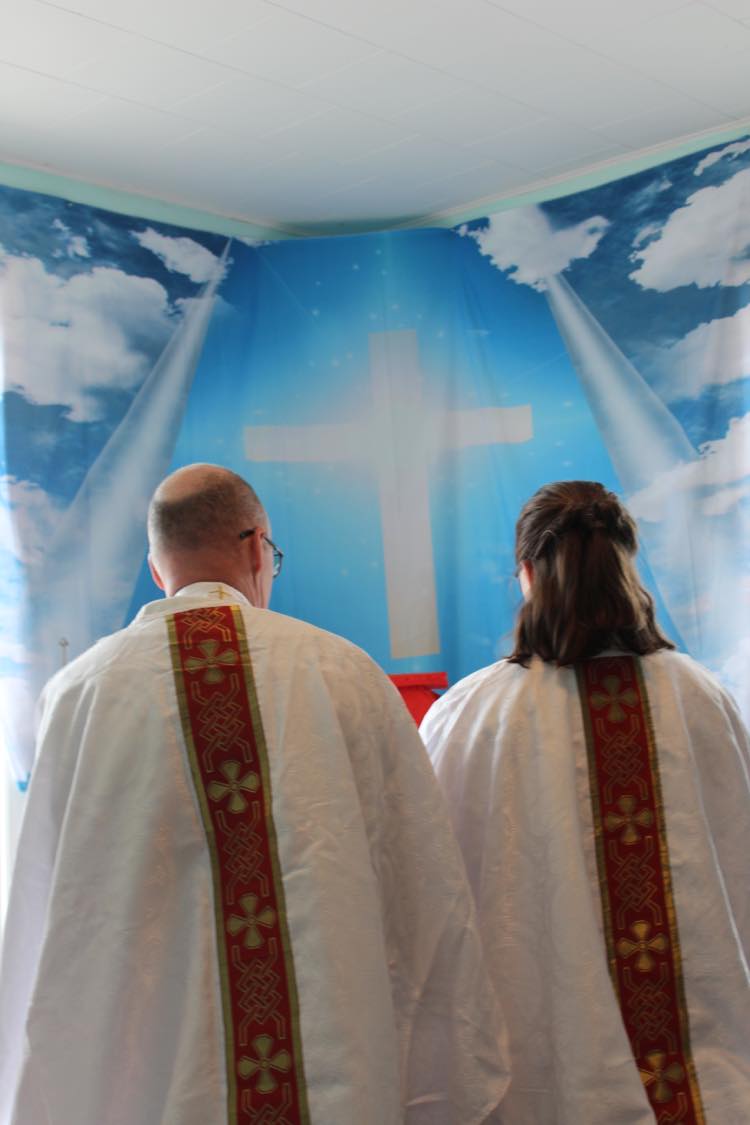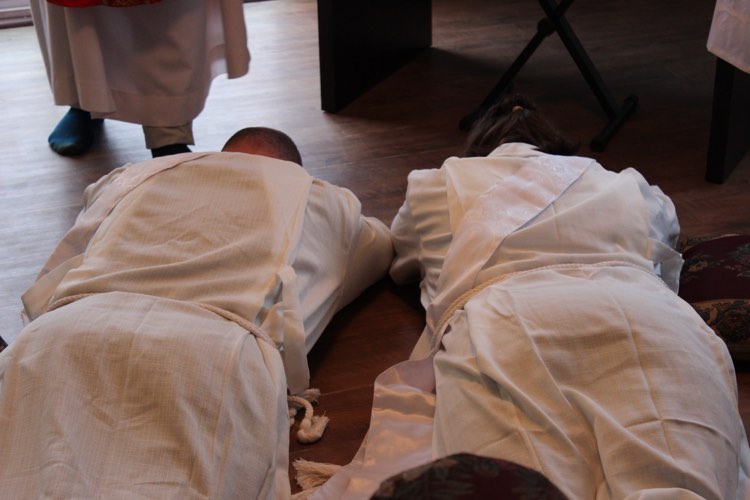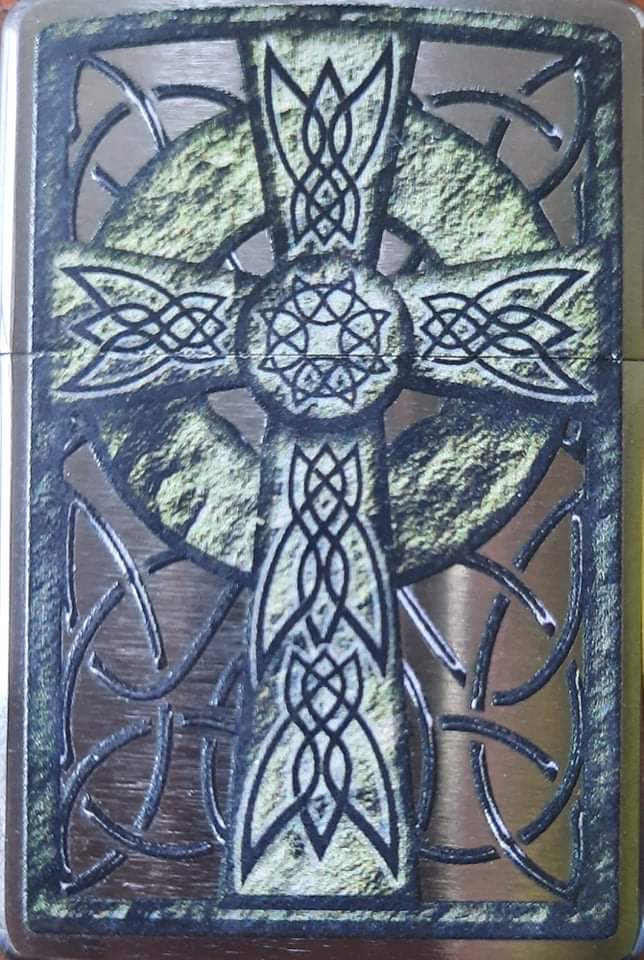- Home
- Seminary Studies
- Catholic Theological Foundations
Simply Catholic and Welcoming You
Catholic Theological Foundations
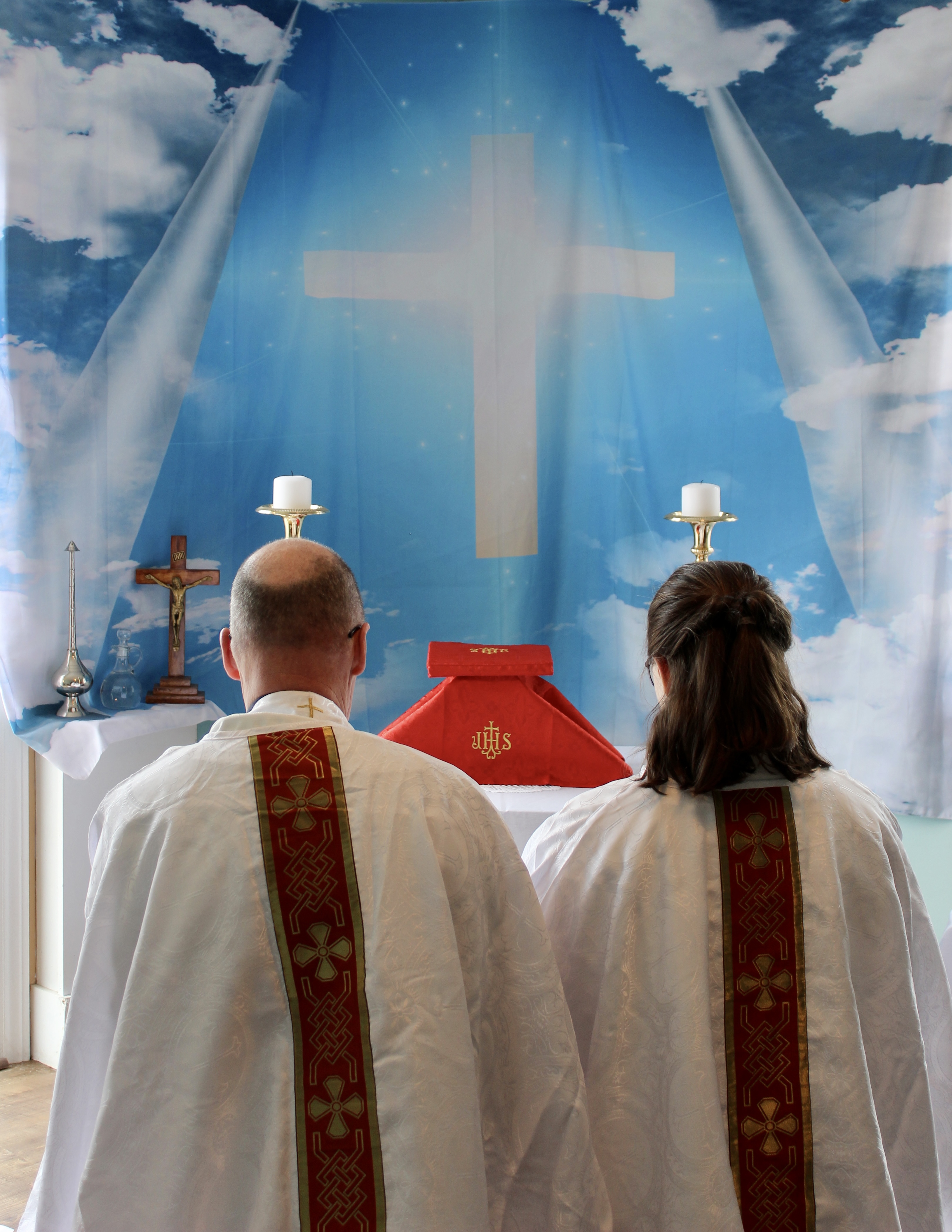
Fr. Philip and Amma Charlene Kneel at an Altar in Prayer
Catholic theological foundations ( the theological foci of Catholicism) includes sacramentality, mediation, liturgy and communion.
Of course, the greatest sacrament of encounter with God is Christ. The church gives us the sacrament of encounter with Christ. The sacraments of the church are the signs and instruments by which that encounter with Christ is expressed, celebrated and made effective for all. Our salvation is based upon our building a personal relationship with Christ our Savior.
The church, sacraments and clergy, when functioning as they should enable our mediation with the sacred as we attempt to grow from sin to greater spirituality. The church also helps mediate the real sense of our encounter with God; rejecting as normal the idea that our encounter with God be only exclusive or that it occurs only within as an expression of conscience or consciousness.
Liturgy is the work of the people. The work of all the faithful. Liturgy is very much the work of the Trinity and is an encounter with God and the church. The liturgy accomplishes the work of redemption. It enables us to witness to others who we are BECAUSE of what Christ has done for us. The liturgy does something in us, to us and for us so that we, in turn, may do something in, for and to the world.
Liturgy literally means the work of the people and demands a response not just an observation. All are called to participate fully.
Our way to God and God’s way to us is itself mediated through community. We are never more in the service of our God than when we are in the service of our fellow man. Communion extends beyond death with the “communion of saints” being a foretaste of our communion with God and humanity.
Overall the Catholic theological foundations encapsulate a sacramental theology. We do what we believe. Coming together regularly for the celebration of the Holy Eucharist/Mass is one of the ways we more publicly witness our faith.
Together we recite the Apostles Creed or the Nicene Creed. Actually listing our beliefs and, by publicly reciting them, bearing testimony to those beliefs.
Under canon laws for each ‘branch’ of Catholicism, is entrenched the belief that each is equal in grace and dignity. This means more than merely saying we can each receive the sacraments from any other branch of Catholicism. It is the expression that the church fathers in each branch see us all as different expressions of the same faith. The “one, holy, catholic and apostolic church”. All with the hope of one day being united in faith and expression.
Catholic Theological Foundations
God's Revelation and the Church's Role
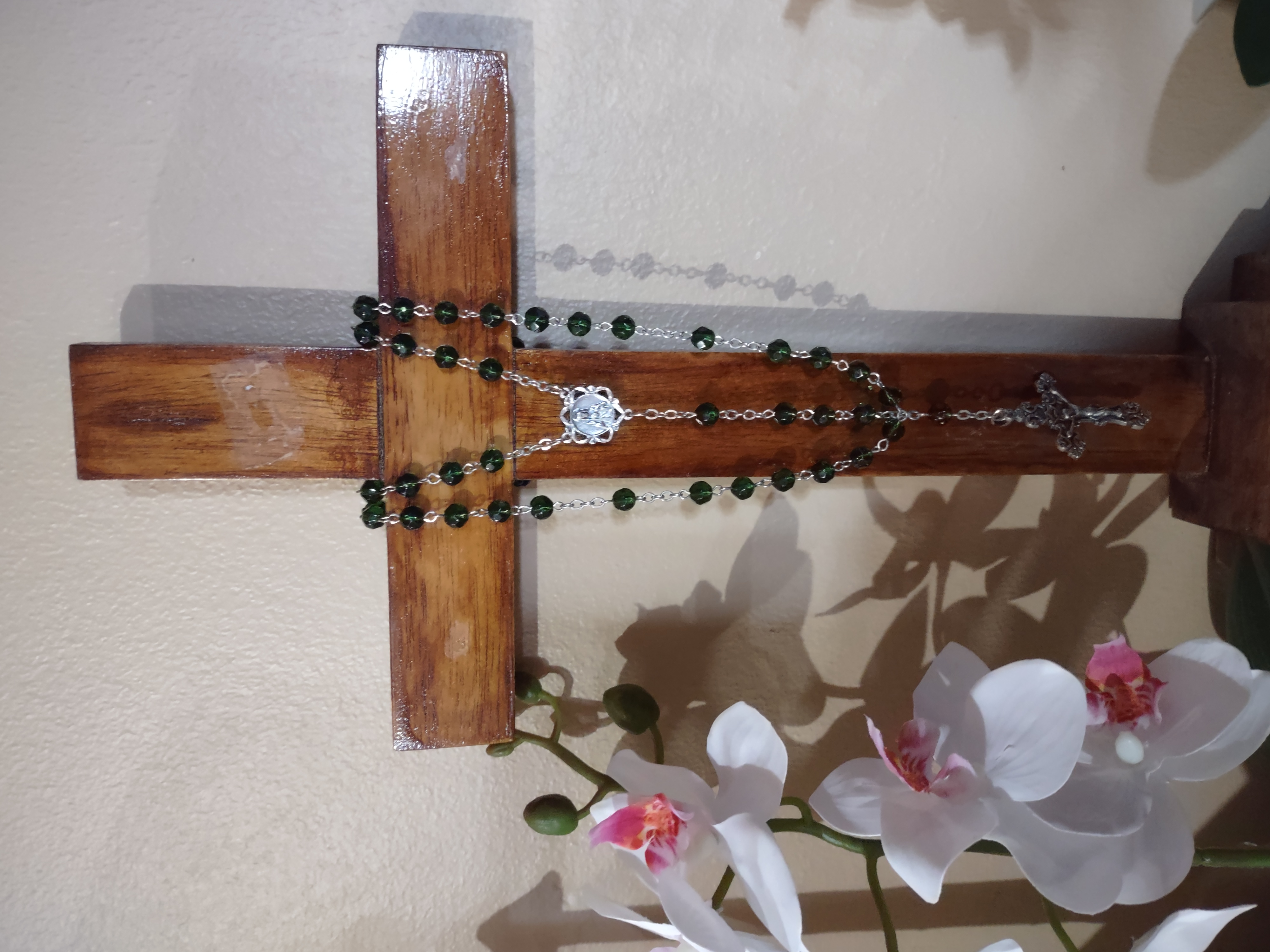
A Rosary Hangs on a Bare Cross Symbols of Devotion and The Risen Christ
Catholic theological foundations are built upon the core beliefs of God's revelation and the Church's role in interpreting and transmitting that revelation through sacred Scripture, sacred tradition, and the Magisterium. These three pillars work together to provide the foundation for Catholic teaching and authority. Any discussion on Catholic theology would be incomplete without acknowledging these long held ‘pillars’ of the church.
Sacred Scripture
The Bible, both the Old and New Testaments, is considered the inspired word of God and a primary source of theological knowledge. To Catholics, interpreting or understanding the scriptures is not an individual's calling but the work of the church leaders in Cathedra, meaning literally from the seat of office.
"In cathedra" (from the seat)
This phrase suggests that the bishop is speaking or acting from the seat of authority, or in his official capacity.
"Ex cathedra" (from the chair)
In Roman Catholicism, this phrase is used to describe pronouncements made by the Pope in his role as the successor of St. Peter, and are considered infallible, meaning free from error, on matters of faith and morals. These pronouncements are binding on all Catholics.
Essentially, "in cathedra" describes the location of authority, while "ex cathedra" describes the authority of the pronouncements made from that location.
Sacred Tradition
In Catholicism, Sacred Tradition refers to the living transmission of the Gospel message, passed down through the Church's teachings and practices, alongside Sacred Scripture. It's a dynamic process where the understanding of the faith deepens and matures over time, guided by the Holy Spirit. Sacred Tradition, along with Sacred Scripture, forms the basis of Catholic doctrine and practice. It is passed down from the apostles to the present day through the Magisterium.
It's the handing on of the Word of God, both written and unwritten, through the teachings and practices of the Church. It includes the teachings of the apostles, the bishops in union with the Pope, and the ongoing interpretation of the faith by the Church. It's not a static set of rules, but a living tradition that evolves and matures over time, guided by the Holy Spirit.
Apostolic Origins
Sacred Tradition stems from the teachings and practices of the apostles, who received the revelation of God directly.
Living Transmission
The message is passed down through the bishops, the successors of the apostles, who guide and interpret the faith.
Development of Doctrine
The understanding of the faith deepens and matures over time, but the core message remains consistent.
Harmony with Scripture
Sacred Tradition is meant to be understood and lived out in harmony with Sacred Scripture.
Both Sacred Tradition and Sacred Scripture are sources of God's revelation and must be accepted and venerated with equal respect.
Sacred Scripture is the written Word of God, while Sacred Tradition is the living transmission of that Word. The two are interconnected and should not be considered separate or contradictory.
Examples of Sacred Tradition
Praying the Rosary, the Divine Office, and other devotional practices.
Devotions to saints.
The practice of making the sign of the cross.
The Sacraments, which are outward signs instituted by Christ to give grace.
The Church's liturgy and sacraments, which are expressions of the faith.
The Magisterium
This is the teaching authority of the Church, which in Roman Catholicism is vested in the Pope and bishops in communion with him or in the College of Bishops in other Catholic Churches, who are entrusted with authentically interpreting and applying the truths of revelation.
In all Catholicism, the Magisterium refers to the Church's teaching authority, responsible for interpreting God's word and tradition. The Magisterium can be divided into the Ordinary Magisterium (ongoing teaching of the Church) and the Extraordinary Magisterium (formal definitions of doctrine).
The Magisterium's role is to ensure the faithful understand and apply the teachings of the Church accurately.
The Ordinary Magisterium is the day-to-day teaching of the Church, found in scripture, tradition, and the ongoing guidance of the bishops.
The Extraordinary Magisterium involves the formal declaration of doctrines, such as the Immaculate Conception of Mary, which, for Roman Catholics, are considered infallible and binding on all Catholics.
The word "magisterium" comes from the Latin word "magister," meaning teacher.
Other key aspects of Catholic theological foundations include
Fundamental Theology
This branch of theology explores the foundations of Christian faith, including the existence and nature of God, revelation, the Church, and the relationship between faith and reason.
God's Revelation
Catholic theology emphasizes that God has revealed himself to humanity through His words and actions, particularly through Jesus Christ, the Incarnate Son of God.
The Trinity
The belief in God as one being existing in three persons: Father, Son (Jesus Christ), and Holy Spirit, is a foundational dogma of Catholic theology.
The Church
The Church is seen as a divinely established institution, founded by Christ, and entrusted with the task of proclaiming and transmitting His message to the world. The Church includes all branches of Catholicism although each likes to express themselves as the only true church, in direct opposition to their own Church Canons (laws).
With this basic overview we hope you are now better able to investigate Catholic theological foundations in more depth. There are many books on this subject however, for simplicity and overall cost savings we choose to study Catholicism by Richard P. Brien as it provides a decent coverage of all things catholic, albeit from a purely Roman/Latin Rite Catholic perspective.
Recent Articles
-
Catholic-Confession
Apr 19, 25 08:53 PM
Full breakdown of the Catholic Confession Sacrament of Reconciliation -
Ordination, incardination and dismissal of clergy
Mar 03, 25 06:47 PM
Overview of Ordination to Holy Orders, incardination and dismissal of clergy -
Catholic Last Rites
Mar 03, 25 06:41 PM
An explanation of the Catholic Last Rites and Anointing of the Sick
